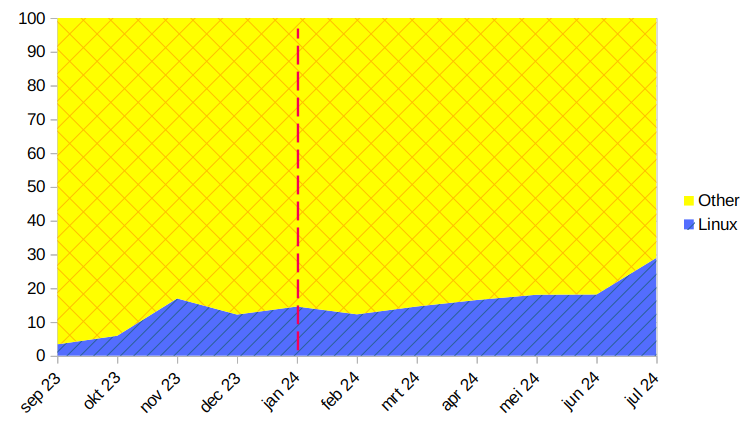These archived versions might give you an idea.
To be honest, I don't know about the PDF versions you can find in Anna's Archive or similar archives/libraries. These methods had apparently been optimized for printed, pocket-sized books.
I consider these methods among those things that have not been necessarily superseded "just because" we have more advanced technology. They were very sophisticated for their time, marketed like many courses of this type to the busy working person, and at the same time were effective and entertaining.
We always had a couple of those books lying around the house (German and French). The annotations and explanations for native English speakers are superb, and the overall presentation of the volumes was of very high quality with minimal typos and errors. I only have found a couple omissions over some three hunded pages or sth which is virtually excellent.
With a good command of the English language that many possess, these books are accessible and effective in language learning, and if I don't omit some books, then you can teach yourself German, French, Italian, and Russian, using these methods. Let me add, they have accompanying cassette tapes (yes! Tapes!) which you can also find ripped in some online libraries.
The texts are tastefully chosen, they involve funny stories, anecdotes, proverbs. The culture and gender roles depicted in these books are dated of course, but it is like traveling back in time to simpler times, where you have to call the music teacher on their landline to tell them they forgot their umbrella, but you don't find him at home, so you have to leave a message to the housemaid, whatever. I look at these stories with a time traveler's curiosity. I do find this kind of thing enjoyable, but this might be a matter of taste.
There is no need to say that the grammar progression is gradual. and there is some opinionated, sublime structure you can vaguely discern, but well perhaps ...you shouldn't? The books make you feel you are in the good hands of some wiser people who have in store for you more and more tips on the language you are trying to learn, which is comforting and takes a load of your head. At some point you do have to pull up a notebook for some grammar stuff, but unless you are serious about learning the language you can as well skip this part and consult the self-contained appendices all the same.
Now there are several things that I think are quite special about this series.
Page numbers are transcribed in a simplified pronunciation system. Lessons are numbered too. Under the text you can find a phonetic transcription, which is not IPA but a custom system, that somehow makes sense to a speaker of English, for instance u with umlaut in German sounds like the last syllable of "view". This is not a novelty of course, but it is very well thought out how discretely it is placed on the page, that you can seamlessly ignore it for pages and pages over, without ever looking at it, but when you actually need it, it is consistently there.
Then, there are some footnotes, as well as some proper notes that are part of the subject matter. These are very thoughtful. Every time you wonder "what now?" about either a grammatical or a cultural thing, you will find the explanation right in the notes.
Everything is made to fit in pairs of pages (English on the left, Target language on the right), so you can look up translations both ways. Everything is discretely numbered so you can cross-reference everything: sentences, notes, lessons, appendices. (See note 7 in lesson 24). After the various stories and episodes that form the main lesson, there is one exercise (also numbered and phonetically transcribed) that delves deeper in grammar stuff and is more bland/repetitive, but usually relates to the main story. The hidden treat here is the comic. Yes, there is a comic strip next to the boring exercise always , so you are tempted to go right through the exercise to get the joke.
Every now and then there are some revision chapters that are blocks of English text breaking down different grammar phenomena.
That is enough said about the design. Everything is designed and placed on the page with taste and sophistication that not all modern apps provide. The whole book fits in a pocket and is dense with compressed, promptly retrievable, information for a language learner.
Design issues aside there is the actual method. At first you just read the texts and the exercises. When you start to get better at it, you have to be able to translate the whole lesson and the exercise. At some point they ask you to get back to first lessons and try to reverse translate from target language to English. Later on they ask you to stop memorizing the main text, but you have to keep on memorizing the exercise and continue the reverse translating. Each lesson can take you up to 20 minutes tops.
Anyway, I don't know if this works for everybody or if it is demonstrably any better than other methods or apps, but I think it is very advanced for its era because every little thing seems to be very well thought out, and it is very smartly designed, so it has set some standards for me personally as to what a good piece of work should look like, be it on paper or on screen. The stories are enjoyable to me, and I reach out to these books as a pastime quite often, and I have picked up some German and French on the way. Now I have found the whole series in Anna's Archive and I am tempted to look into Russian and Italian too, but let me tell you, these books really shine in the printed book format for which they are designed. I tried to use them with a PDF viewer and they are not as easy to handle as the printed book. So if you happen across any of them in a thrift store or something give them a chance, they might become treasured items of your collection, especially if you are into languages.
Still bugs me how this level of detailed organization and proof-reading was even possible before computers, but it is really impressive!


